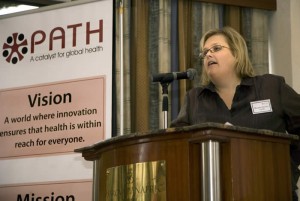Denise Lionetti, IYCN project director, shares her experience at the National Infant and Young Child Feeding Stakeholders’ meeting below.
During World Breastfeeding Week, I traveled to Kenya, along with my colleague Albertha Nyaku, IYCN’s nutrition advisor based in South Africa, to participate in an infant feeding stakeholders’ meeting, at the Panafric Hotel in Nairobi. We joined more than 100 colleagues from the Ministry of Public Health and Sanitation (MOH), USAID, UNCIEF, and other organizations from most provinces in the country for lively discussions and presentations during the half-day meeting.

Margaret Brawley, a program officer for PATH Kenya, at the National Infant and Young Child Feeding Stakeholders' Meeting on August 6, 2009.
In her opening address, Linda Komen from the MOH’s Nutrition Division, expressed the Ministry’s concern about low breastfeeding rates in the country—only 2.6% of mothers exclusively breastfeed at six months. She said that breastfeeding has further deteriorated with the onset of HIV and the post-election emergency. Echoing the theme of this year’s World Breastfeeding Week, she stressed that good breastfeeding practices should not be forgotten, especially during emergencies. Learn more about infant and young child feeding in Kenya by viewing Linda Komen’s presentation.
One presentation that really stood out to the group and captured the essence of this week was by PATH’s Margaret Waithaka. She discussed the Kenya Infant Feeding Assessment, recently conducted by IYCN and PATH. The goal of the assessment was to document mothers’ and infants’ experiences during the time they stopped breastfeeding. Everyone found this presentation very informative because it gave attention to the variety of cultural practices in Kenya that are barriers to good infant feeding practices. People make a lot of assumptions about breastfeeding and having factual information gives the nutritionists a greater ability to address these issues.
During the meeting, the MOH moderated several discussions to give participants an opportunity to voice their ideas and concerns about good infant nutrition to the Ministry. The discussions were very participatory, but also very charged. Kenya lags behind other countries when it comes to breastfeeding rates and bottle feeding appears to be increasing. People are discouraged about the low rates, but there is a lot of hope and encouragement to take new approaches back to the community, such as mother-to-mother support groups, grandmothers groups, and male involvement. And while these ideas themselves are not completely novel, there was a lot of enthusiasm for implementing community-based approaches to improve infant feeding behaviors.
Learn more about IYCN activities in Kenya.
Photos: Evelyn Hockstein
Date: Sep 15, 2009 | Category: Updates from the field
